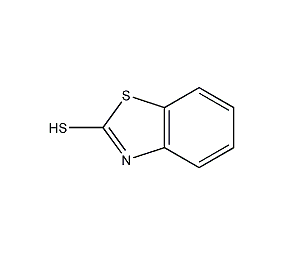
Structural formula
| Business number | 03XQ |
|---|---|
| Molecular formula | C7H5NS2 |
| Molecular weight | 167.25 |
| label |
2-Mercapto-1,3-thiazine, 2-benzothiazolethiol, Benzothiazole thiol; accelerator M; M quick-cooking powder; 3-thiazole, 2-mercapto-1,3-N-indene, Benzothiazolyl mercaptan, MBT, Organic corrosion inhibitor materials |
Numbering system
CAS number:149-30-4
MDL number:MFCD00005781
EINECS number:205-736-8
RTECS number:DL6475000
BRN number:119484
PubChem number:24886948
Physical property data
1. Character: light yellow monoclinic needle-shaped or leaf-shaped crystal. It has a bitter taste and an unpleasant odor.
2. Melting point (℃): 178~180
3. Relative density (g/mL, water=1, 25℃): 1.42~1.52
4. Flash point (ºC): 515~520
5. Solubility: Slightly soluble in hot water, soluble in alcohol, chloroform, acetone, carbon tetrachloride, etc. Easily soluble in ethyl acetate, acetone, soluble in ethanol, propanol, chloroform, ether, carbon disulfide, ammonia, sodium hydroxide and sodium carbonate and other alkaline solutions, slightly soluble in benzene, insoluble in water and gasoline.
6. Lower explosion limit (%, V/V, dust): 21
Toxicological data
Acute toxicity: Rat oral LD50: 100 mg/kg;
Rat intraperitoneal LD50: 300 mg/kg;
Mouse oral LC50: 1158 mg/ kg;
Mouse abdominal LC50: 100 mg/kg;
Rabbit transdermal LD50: >7940 mg/kg.
Ecological data
General Notes
Do not allow this product to come into contact with groundwater, waterways or sewage systems.
Water Hazard Level 2 (German Regulation) (self-assessment via list) The substance is hazardous to water.
Do not allow this product to come into contact with groundwater, waterways, or sewage systems, even in small amounts.
It is also poisonous to fish and plankton in the water.
Do not discharge materials into the surrounding environment without government permission.
Highly toxic to organic matter in water.
Molecular structure data
1. Molar refractive index: 48.74
2. Molar volume (cm3/mol): 118.8
3. Isotonic specific volume (90.2K): 336.9
4. Surface tension (dyne/cm): 64.5
5. Polarizability (10-24cm3): 19.32
Compute chemical data
1. Reference value for hydrophobic parameter calculation (XlogP): None
2. Number of hydrogen bond donors: 1
3. Number of hydrogen bond acceptors: 2
4. Number of rotatable chemical bonds: 0
5. Number of tautomers: 2
6. Topological molecule polar surface area 69.4
7. Number of heavy atoms: 10
8. Surface charge: 0
9. Complexity: 158
10. Number of isotope atoms: 0
11. Determine the number of atomic stereocenters: 0
12.�The intermediate of �, 2-mercaptobenzothiazole, 1-amino-4-nitroanthraquinone and potassium carbonate are refluxed in dimethylformamide for 3 hours to prepare the dye disperse red S-GL (C.I.Disperse Red 121 ). This dye is used for dyeing polyester and its blended fabrics. 2-Mercaptobenzothiazole is also called acidic copper plating brightener M when used as an electroplating additive. It is used as a spreading aid brightener in bright copper plating with copper sulfate as the main salt. In addition, this product is also used to prepare pesticide fungicides, nitrogen fertilizer synergists, cutting oils and lubricant additives, organic anti-ashing agents in photographic chemistry, metal corrosion inhibitors, etc. In addition, it is a reagent for chemical analysis. This product has low toxicity and is irritating to the skin and mucous membranes.
7. For water treatment, its sodium salt is generally used. It is easily oxidized in water, such as chlorine, chloramine and chromate, which can oxidize it. When using chlorine as a bactericide, this product should be added first, and then the bactericide to prevent it from being oxidized and losing its sustained-release effect. It can be made into an alkaline solution and used together with other water treatment agents. The mass concentration used is usually 1 to 10mg/L. When the pH value is lower than about 7, the minimum dose is 2mg/L.
8. It is used as an additive for bright sulfate copper plating and has good leveling effect. It can also be used as a brightener for cyanide silver plating.

 微信扫一扫打赏
微信扫一扫打赏

